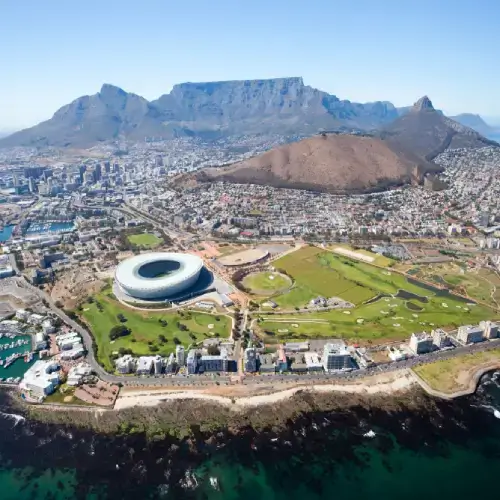Home / Compare Travel Insurance / Travel insurance for Sou…

Key takeaways
From the coastal city of Cape Town to Kruger National Park, South Africa is a land of many wonders. However, if you’re going to journey across such a country, you should first consider taking out a travel insurance policy. Here’s a few things to consider when planning your trip:
- Australia doesn’t have a Reciprocal Health Care Agreement with South Africa, so if you need medical assistance any costs will be out-of-pocket, unless you have a travel insurance policy with medial cover.
- If you love adventure, make sure you’re covered for it. Not all adventure activities are covered automatically by your policy; instead, you may need to purchase extra cover for an additional premium.
- Theft and pickpocketing are always a risk when travelling. Make sure your policy covers your luggage and personal belongings in case something goes wrong.
Do I need travel insurance for South Africa?
We recommend that every traveller consider travel insurance, regardless of their destination. South Africa can be a wonderous place where you can experience relaxing in style in Sun City or take a hair-raising guided tour through a safari. If all goes to plan, your trip could be the adventure of a lifetime; but what if it doesn’t?
Without travel insurance, you may find yourself potentially paying thousands of dollars out of pocket should something go wrong. If you’d like cover for accidents, illnesses, cancellations, delays or losses and damages you might encounter on your trip, travel insurance may be something you need.
This is why getting travel insurance for Africa is a crucial step of planning a holiday there. With the right policy, you could be covered for all those things and more, meaning you can fully focus on your trip knowing you’re financially protected against the unexpected.
Expert tips for choosing the right travel insurance for South Africa
Our Executive General Manager of General Insurance, Adrian Taylor, has compiled some top tips for when you’re searching for a travel insurance policy that suits your trip.

Decide what level of cover is needed
Different levels of cover may suit different trips and budgets. A comprehensive policy is the most inclusive, and may offer cover for medical treatment, cancellation fees, personal liability, theft and more. If you’re planning to drive, also consider any rental vehicle excess cover and additional add-ons you may need to get the best travel insurance for your trip.
Adjust your excess amount to suit your needs
Your excess is the amount you pay out-of-pocket towards a claim, so it’s always important to choose an amount you’re able to pay. However, you can choose to increase your excess in order to reduce your premium.
Declare any pre-existing medical conditions to your insurer
When applying for a travel insurance policy, it’s important to declare your pre-existing medical conditions. If it’s not an automatically covered condition, your insurer will need to decide whether they can offer you cover for the medical condition, which may cost an additional premium.
What should my travel insurance policy for South Africa include?
When on holiday, you want to live each day to the fullest. Whether you plan to kick back by the pool or strap on your hiking boots, you might want to include a few key things in your cover when journeying to South Africa, for your peace of mind.
Make sure you review the Product Disclosure Statement (PDS) and the policy wording before purchasing your cover to understand the ins and outs, as well as the Target Market Determination (TMD) to check your suitability for the policy.
Medical cover and 24/7 assistance

It’s a good idea to check whether the travel insurance you take out includes cover for medical expenses. Australia doesn’t have a Reciprocal Health Care Agreement with South Africa, which means you’ll have to pay for any healthcare you require while travelling.
However, one good thing about getting travel insurance is that you may be financially covered for things like the common flu, malaria or even something more serious like a broken arm. Hospital fees, medical evacuations and more can be covered by a travel insurance policy, all of which can be expensive to pay yourself.
South African public hospitals may treat overseas visitors for free; however, the standard of medical care may not be equivalent to what you’d expect in an Australian hospital. Private hospitals generally have better-quality medical care but will often want up-front payment, which can be expensive without travel insurance to cover you.1
To ensure you’re adequately covered for a high level of medical care without potentially paying thousands out of pocket, you should consider a comprehensive travel insurance policy. This top-level cover includes emergency assistance, medical emergencies, medication, hospital fees and repatriation.
Travel delay and cancellation cover
When you’re heading overseas, you’ll probably want to see of much as the country as possible – which means a lot of travelling. However, South Africa is known to have rolling blackouts that can affect traffic lights and cause travel delays or cancellations.
You may plan to fly to Johannesburg from Cape Town, only to find road closures cause delays and you miss your flight, disrupting your travel plans. Your comprehensive travel insurance cover may be able to provide assistance, such as paying for an extra night’s accommodation until you can catch the next flight. Or, if unforeseen circumstances cause you to need trip cancellation cover, your international travel insurance may be able to reimburse you for flights and accommodation.
Adventure cover
If you like adventure, South Africa can be a great holiday destination; it has incredible wildlife that you can experience up close by embarking on safari tours. And the adventures don’t stop there! Maybe you’re planning to jump off the world’s highest commercial bridge bungee in South Africa’s Garden Route or ride an ostrich (yes, you can really do this); either way, if you’re participating in activities that aren’t covered by general travel insurance, consider purchasing an adventure cover add-on.
This add-on may cover you for these more dangerous activities that aren’t included in standard insurance. As policy inclusions differ from insurer to insurer, remember to check out the PDS to know precisely what you are and aren’t covered for.
Exclusions in South Africa travel insurance

Of course, travel insurance won’t cover every possible thing that can happen on your trip, which is why it’s important that you read and fully understand all the inclusions and exclusions of your policy outlined in the PDS.
Here are a few standard exclusions that you might find on your policy:
- Unattended luggage. If someone steals your luggage while it was unattended, your insurer might reject your claim.
- Illegal or reckless activities. Your insurer may reject your claim if it results from an incident where you knowingly acted recklessly or illegally, or deliberately put yourself in danger. For example, you may not be covered if you were under the influence of drugs or alcohol at the time of the incident you’re claiming for.
- Sickness due to being unvaccinated. If you didn’t get the proper vaccinations before you left Australia, you might not be able to claim for medical costs should you fall ill from a vaccine-preventable illness.
- Extreme and winter sports. Unless offered by your insurer as an optional extra, you may not be covered for participation in extreme, winter and other adventure sports.
- Third party compensation. If you’ve already been compensated for delays or cancellations by a third party (e.g. your airline or tour company), your insurer likely won’t pay you out again.
Is South Africa safe?
Like all countries, there’s always a chance something could go wrong. Here are a few things to be aware of on your trip and tips to stay safe:
1. Be aware and cautious when driving
South Africa doesn’t require travellers to have an international driver’s license to rent a vehicle; just an Australian license. However, there are some things to remember before you jump in the driver’s seat:
- Don’t stop to feed any wild animals.
- Carry extra fuel and drinking water with you, as petrol stations are scarce the further away you are from populated areas.
- Always lock up your vehicle, leaving nothing inside the car that can be spotted from outside.
- Drunk drivers and road hazards are common, so stay alert when driving, especially at night.
- Be aware of potential car-jackings and theft at night, in busy intersections and on main roads. Keep all doors locked even when you’re driving.
If you’re involved in a car accident, your rental car excess may be covered by your travel insurance, depending on your policy.
2. Consider your health before you leave
According to Smartraveller, you may need to show a yellow fever vaccination certificate before you enter South Africa if you’re arriving from a yellow fever-endemic country.1 Malaria and cholera are common in some areas of South Africa, as are tuberculosis, hepatitis, measles, rabies, Rift Valley fever, bilharzia (schistosomiasis) and typhoid.
This is general advice, so be sure to ask your GP well in advance of your departure for up-to-date advice on which vaccinations and medications you may require. Failing to get inoculated may mean you cannot claim on your insurance.
Finally, be mindful that the rate of HIV/AIDS in South Africa is extremely high.
3. Avoiding theft, robbery and scams
There are a number of ways that criminals may target tourists in South Africa,¹ but so long as you remain vigilant and exercise caution wherever you go, you should be fine. However, keep in mind that:
- Violent crime typically increases at night. Never travel alone, and stick to crowded, well-lit areas.
- There’s no such thing as ‘Tourist Police’. It’s just criminals looking to steal your belongings and cash.
- ATMs in busy locations may be targeted as ideal places to skim credit cards. Be wary of this by only using ATMs in controlled areas, like banks, rather than out in the street.
- Watch your drinks. Criminals have been known to spike beverages and then rob incapacitated individuals.
- Don’t wear a lot of jewellery. It’s also a good idea to not display your phones, handbags or other valuables.
If you’re worried about the cost of replacing your belongings, travel insurance is a smart idea. Provided you took as much care as possible to keep your things safe, you may be able to claim back their value if they’re stolen, lost or destroyed.
Meet our travel insurance expert, Adrian Taylor
As a General Insurance expert with over 13 years’ experience in financial services, Adrian Taylor believes in educating customers about the importance of travel insurance so that anyone can kick back and make the most of their time away from home. While no one wants a disrupted holiday, a suitable travel insurance policy can provide a financial safety net for yourself, your belongings and your trip in case things go wrong.
1 Smartraveller. South Africa. Last updated Dec 2023. Accessed Jan 2024.


